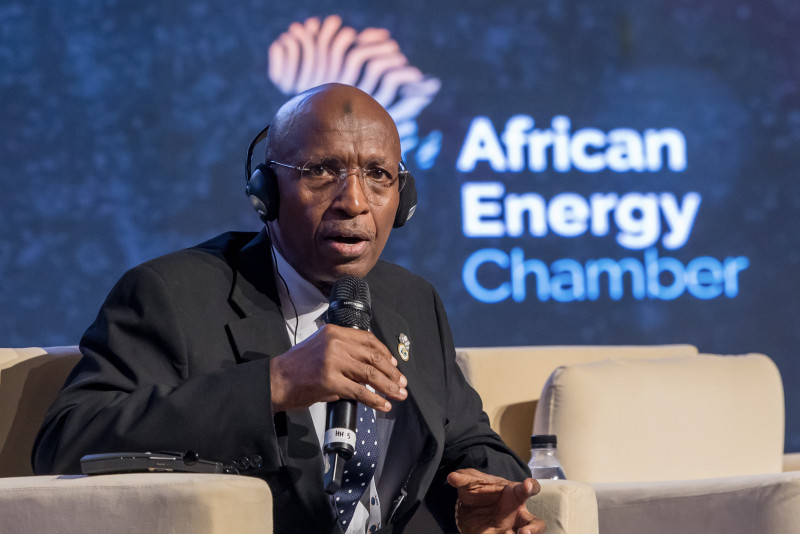| ACCRA, Ghana, May 28, 2025/ — The Mining in Motion Summit (MininginMotionSummit.com) is pleased to announce the participation of Hon. Ibrahim Murtala Muhammed, Ghana’s Minister for Environment, Science, Technology and Innovation, as a speaker. Hon. Muhammed’s involvement underscores the government’s commitment to environmentally responsible mining, technological innovation and scientific advancement in the extractive sector.
As the head of the ministry leading innovation and sustainability, Hon. Muhammed is spearheading initiatives to align mining operations with national development goals and environmental stewardship. His efforts include forging partnerships with global public and private stakeholders to implement science-based solutions and sustainable practices. In April 2025, the Minister met with Park Kyongsig, Ambassador of the Republic of Korea (apo-opa.co/45r33JW) to Ghana, to explore bilateral cooperation on climate change and environmental protection. Their discussions centered on leveraging Korean expertise to restore water bodies impacted by illegal mining and address the root causes of environmental degradation. In February 2025, Hon. Muhammed reiterated the government’s commitment (apo-opa.co/4dV4wKZ) to leveraging local innovation as a driver of economic growth, particularly within key industries like mining, which continues to play a vital role in Ghana’s economy. Gold exports reached $11.6 billion in 2024, accounting for 57% of the country’s total export revenue, highlighting the sector’s significance in national development. In line with modernization efforts, the government, through the Minerals Commission of Ghana (apo-opa.co/3H8AM0P), is equipping the next generation of workers with skills in emerging technologies such as drones, which are being deployed to support automation and improve sector monitoring. Under the World Bank-funded Ghana Landscape Restoration and Small-Scale Mining Project (apo-opa.co/4kHR9Qr), the country is actively addressing land degradation and promoting sustainable practices among artisanal and small-scale miners, ensuring mining sector contribution to economic growth and long-term environmental and social sustainability. At Mining in Motion, Hon. Muhammed will engage with key stakeholders from the mining industry, academia and civil society to exchange insights on policy, innovation and the future of mineral resource governance in Ghana. The summit, led by the Ashanti Green Initiative under the leadership of Oheneba Kwaku Duah, Prince of the Ashanti Kingdom, is hosted in partnership with the World Bank and the World Gold Council. Distributed by APO Group on behalf of Energy Capital & Power. For sponsorship opportunities or delegate participation, contact: About Mining in Motion Summit: SOURCE |
Category: Banking & Fianace
-
-
Development of Islamic banking in Russia possible through a dual banking system — ministry
“It comes to the parallel functioning of the traditional and Islamic banking sectors, as has already been implemented in Malaysia, Kazakhstan, and Azerbaijan,” Deputy Economic Development Minister Dmitry Volvach said
MINERALNYE VODY /Stavropol Region/, May 27. /TASS/. Further development of the experiment on the introduction of partnership financing, aka Islamic banking, is possible through the creation of a dual banking system in Russia, Deputy Economic Development Minister Dmitry Volvach said at the Caucasus Investment Forum (CIF).
“One of the possible ways for further development [of partnership financing] is seen in the formation of a dual banking system, when it comes to the parallel functioning of the traditional and Islamic banking sectors, as has already been implemented in Malaysia, Kazakhstan, and Azerbaijan. Of course, this will require a serious update of the regulatory framework, a large layer of professional personnel, <…> appropriate modern digital platforms and mechanisms, integration with existing institutions,” Volvach said at the session “Partnership Financing and International Cooperation.”
According to him, such an approach will increase the stability of the entire financial system, and also “open access to new sources of investment liquidity.”
“Russia will be able to actively interact with OIC member states to create investment platforms, support infrastructure, environmental and social projects,” he added.
According to the Deputy Minister, the principles of Islamic banking are in harmony with the ESG concept (environmental – ecology, social – social sphere, governance – corporate management).
“The values of Sharia particularly emphasize fairness, ethics and sustainability, which makes Islamic financing a natural partner in the ESG transformation of the economy and in the corresponding international agenda. This creates the potential for issuing green bonds, social funds, attracting investors focused on sustainable development,” Volvach stressed.
According to him, today partner financing represents a “strategic development reserve” that can ensure the influx of additional investment into the country’s economy in the face of external challenges and pressure.
“Fulfilling the potential will require further consolidation of the efforts of the state and business, harmonization of legislation, digitalization of processes, integration of the global financial structure, but such an approach will certainly create a reliable foundation for further sustainable investment growth,” Volvach noted.
The experiment on the development of partnership financing is taking place from September 1, 2023 to September 1, 2025 in Russia’s republics of Bashkiria, Tatarstan, Chechnya and Dagestan. Earlier, a bill was introduced to the State Duma, the lower house of the Russian parliament, to extend the experiment until September 1, 2028.
Islamic banking means conducting banking activities in accordance with Islamic norms. Payment of interest and derivative interest transactions, transactions with conditions of uncertainty, as well as financing of certain sectors of the economy such as gambling, pork production, alcoholic beverages, tobacco, weapons, ammunition are banned.
You cannot finance trade in all abovementioned areas. Common Islamic banking operations are installments, leasing, and equity financing.
The Caucasus Investment Forum is underway in Stavropol from May 25 to 27 on the territory of the exhibition center Minvodyexpo. TASS is the information partner of the event.
SOURCE
RUSSIAN NEWS AGENCY
-
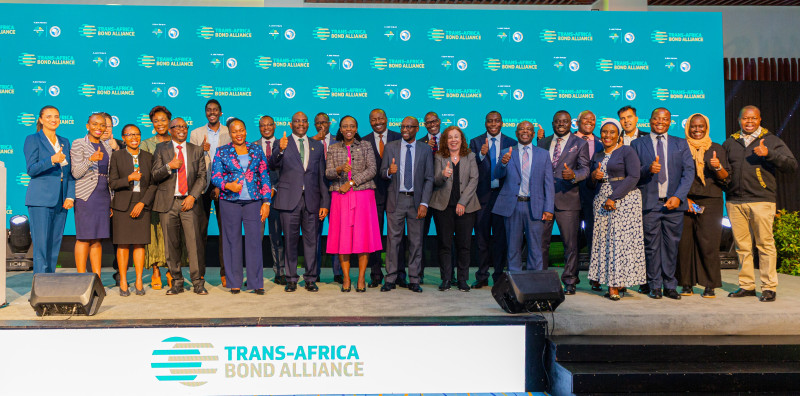
Afreximbank and Zep-Re launch the Trans-Africa Bond Alliance (TABA)
The African Export-Import Bank (Afreximbank) (www.Afreximbank.com) and Zep-Re (PTA Reinsurance Company) have launched the Trans-Africa Bond Alliance (TABA), a transformative initiative, designed to bridge the insurance capacity gap and empower African contractors to secure more construction and procurement projects while boosting cross-border trade and enhancing the movement of goods and investment across Africa,said an official statement issued in Nairobi,Friday.
By providing robust transit guarantee mechanisms, the joint venture between Afreximbank and Zep-Re is expected to reduce trade barriers, lower costs, and improve efficiency in the movement of goods across Africa. Moreover, TABA will promote seamless cross-border trade and the growth of trade insurance business within the continent, all within the transformative framework of the African Continental Free Trade Agreement (AfCFTA), which aims to create a single market for goods and services across 54 countries.
By facilitating seamless transit trade, TABA will strengthen the trade insurance sector, making it easier for businesses to operate with confidence while minimising financial risks.
Speaking at the launch, H.E Veronica M. Nduva, CBS, Secretary General of the East African Community (EAC) noted, “The East African Community has long been committed to fostering regional integration and economic development. Indeed, our two pillars of the four of establishment are a customs union and a common market.
The establishment of TABA aligns seamlessly with our regional integration program, which aims to enhance cross border trade, reduce trade costs and promote economic growth across the continent with simplified trade regimes.”
Africa has around 110 borders, with 16 land-locked countries relying on complex and costly trade processes. According to African Development Bank (https://apo-opa.co/42cf7vn), transport charges in some cases exceeding the value of goods being traded. With TABA, traders can transport goods from Cape Town to Cairo using a single transit bond, significantly reducing delays and cutting trade costs.
This transformative solution enhances the efficiency of African supply chains while ensuring customs authorities receive guaranteed revenue in the event of procedural breaches.
The establishment of TABA builds on decades of efforts to bolster intra-African trade through key financial and insurance institutions. By leveraging expertise from these institutions; Afreximbank, which is playing a critical role in trade finance and facilitation since its founding in 1993, and ZEP-RE, a leading reinsurance provider supporting trade insurance solutions across Africa,
TABA aims to address the challenges businesses face in navigating Africa’s diverse regulatory environments. The alliance will harmonize trade practices and introduce a standardised framework that ensures secure, predictable, and efficient trade movement.
Mr Denys Denya, Senior Executive Vice President of Afreximbank, said:“Today we forge a new alliance to dismantle the artificial barriers and tighten the bolts and nuts of the wheels of trade and investment flows across national borders. This couldn’t have come at any other time than now, when the pillars of global cooperation and integration are being disintegrated, and fragmentation, isolationism and protectionism have taken hold in our world.
Through this collaboration, our goal is not to displace local operators but to boost the capacity and efficiency of interstate transit regimes, paving the way for a continental framework under the AfCFTA.”
Ms Hope Murera, Managing Director and CEO of Zep-Re (PTA Reinsurance Company), noted during the launch the impact TABA would make in Africa trade ecosystem. She said, “Today, we are not just unveiling a new partnership—we are ushering in a new era. One that reimagines how we facilitate trade, manage risk, and support cross-border movement across our continent.
ZEP-RE’s experience and impact through flagship regional programs demonstrates what is possible when vision meets action. TABA represents a shared vision—a vision where Africa is connected by bridges of opportunity, not barriers”.
TABA introduces a streamlined approach to trade facilitation by leveraging Transit Bonds, Performance Bonds, and Standby Letters of Credit (SBLCs) to guarantee the secure movement of goods. This initiative will:
- Enhance trade efficiency by eliminating delays caused by multiple national bond requirements,
- Boost investor confidence through a structured and transparent customs guarantee system,
- Reduce trade costs, making African exports more competitive on a global scale,
- Ensure compliance with customs regulations, preventing illicit trade and securing revenue for governments and
- Expand market opportunities for African businesses by enabling smoother cross-border trade.
Following today’s launch, key stakeholders will engage in B2B meetings and marketplace interactions to discuss strategies for implementing TABA across Africa. The alliance will also roll out an awareness campaign to educate businesses and financial institutions on the benefits and operational framework of the new system.
Distributed by APO Group on behalf of Afreximbank.
Media Contact:
Vincent Musumba
Communications and Events Manager (Media Relations)
Email:press@afreximbank.comMedia Contact:
Richard Ryaganda
Senior Communications Officer
Email: rryaganda@zep-re.com -
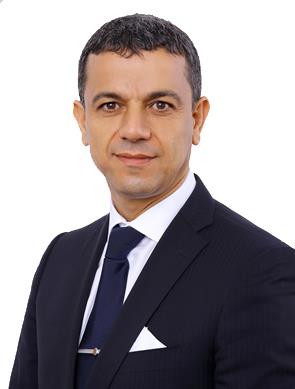
Commitment to Supporting Integrity and Growth of the Islamic Financial Services Industry
By: Mohammed A.Abu
The General Council for Islamic Banks and Financial Institutions (CIBAFI) submitted its comments to the Accounting and Auditing Organization for Islamic Financial Institutions (AAOIFI) on the Exposure Drafts (EDs) on “Auditing Requirements for Assessing Compliance with Shariah Principles and Rules” and “Principles of Assessment of the Necessity for Obtaining Conventional Reinsurance by Takaful Institutions.”
Representing the collective perspective of its membership from more than 30 jurisdictions, CIBAFI’s submission highlights several areas requiring further clarification and enhancement in both drafts. For the Shariah compliance auditing framework, CIBAFI emphasized the need for additional guidance on application scope, auditors’ responsibilities, and addressing emerging challenges from digital transactions and AI systems.
This was contained in an official statement issued in Manama, Bahrain, Sunday.
Regarding the Takaful reinsurance draft, CIBAFI the statement said, identified key areas for refinement including definitional clarity, numerical thresholds, and structural considerations.
The organization also noted that certain elements of this draft might be better positioned within revised Shariah Standards rather than Governance Standards.
“These submissions reflect our ongoing commitment to advancing robust frameworks that support the continued growth and integrity of the Islamic Financial Services Industry,” CIBAFI also stated.
“CIBAFI continues to support the Islamic Financial Services Industry through advocacy, global representation, and various initiatives including specialized publications and comprehensive professional development programmes”, the organization further stated.
The complete detailed comments submitted to AAOIFI are available on CIBAFI’s website: www.cibafi.org.
-
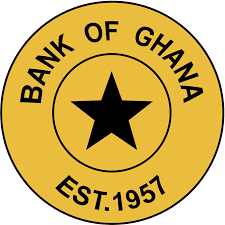
Piloting Cedi-Naira Currency Swaps Fintech Solutions
By: Mohammed A. Abu
Ghana’s Central Bank (Bank of Ghana) has denied some earlier local media publications that it had licensed MTN Ghana to conduct cross-border transactions with MTN Nigeria.
The bank under its Sandbox programme to study emerging Fintech innovations, has rather approved Brij Fintech Ghana, a licensed Payment Service Provider(PSP) to conduct a limited testing of BrijX-a B2B Currency Swap Platform,it said in a Public announcement in Accra,Thursday.
The platform the Bank said, is built to act as a digital marketplace that collaborates with banks, mobile money operators and licensed PSPs to enable direct currency swaps between the Ghanaian Cedi and the Nigerian Naira without the need for forex or movement of funds across borders.
The Pilot, which was approved in 2024, the Bank disclosed, began life testing in February 2025, with MoMo Customers and soon with G-Money customers.
The testing, it added, is safely governed by several restrictions including transaction limits, limits on the number of customers and testing period while it has also ensured, the incorporation of Anti-Money Laundering(AML), Know Your Customer(KYC) and consumer protection requirements.
“At the end of the pilot project, Bank of Ghana will review the results to determine the appropriateness of the BrijX model to inform future policy” the Bank said adding, “The Bank remains committed to being responsive to stakeholder interest in safe, efficient and affordable cross-border payments particularly in Africa and will continue regulatory exploration through this and other on-going initiatives”
-
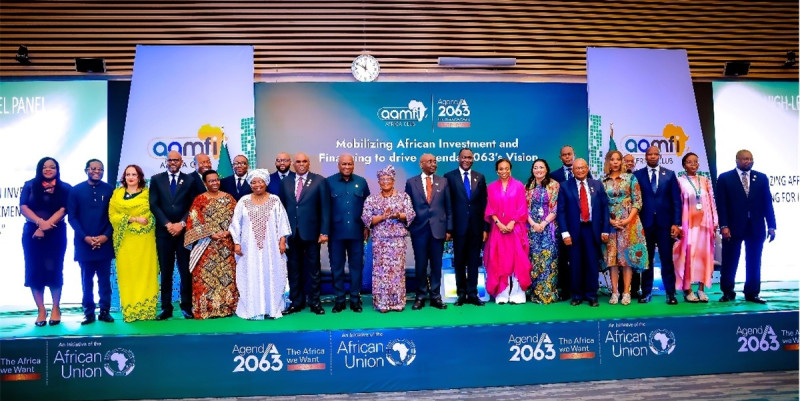
African Leaders Unite to Mobilize African Investment and Financing for Implementing Agenda 2063
ADDIS ABABA, Ethiopia, February 27, 2025/ — On the sidelines of the 38th Ordinary Session of the Assembly of the African Union Summit in Addis Ababa, Ethiopia, African Heads of State, Government and Business Leaders convened for a Presidential Breakfast Dialogue to address the continent’s financing and investment gaps. The event was held under the theme “Africa at the Forefront: Mobilizing African Investment and Financing for Implementing Agenda 2063”.
The dialogue, which was hosted by His Excellency John Dramani Mahama, President of the Republic of Ghana and Champion on African Union Financial Institutions, in collaboration with the African Union Commission (AUC) and the Alliance of African Multilateral Financial Institutions (AAMFI), reaffirmed the continent’s commitment to accelerating self-reliant, sustainable economic development.
In his keynote address, President Mahama emphasized the urgency of strengthening Africa’s financial independence through domestic resource mobilization, concessional financing, and strategic public-private partnerships. “Africa must harness its own financial and investment capacities to drive the transformative vision of Agenda 2063. We cannot continue to rely on external financing mechanisms that do not align with our long-term development goals,” he stated.
Dr. Ngozi Okonjo-Iweala, Director General, World Trade Organization (WTO) emphasized the need for Africans to take charge of their own development by shifting mindsets and strengthening financial self-sufficiency.
She Said, “The Africa Club is a crucial step toward looking inward and harnessing our own potential. However, we need to focus on four key priorities for Africa’s financial and economic transformation: Firstly, strengthening African financial institutions – If we are to finance our continent’s development, we must capitalize our own financial institutions, including national development banks, ensuring they have the resources to support Africa’s needs.
Secondly, let’s address debt challenges to attract investment – we must focus on attracting and retaining investment, including foreign direct investment (FDI), and implementing coordinated strategies to leverage equity financing. Instead of relying on aid, Africa should push for partnerships that channel financial resources into investments.
Thirdly, let’s leverage domestic resources – with over $250 billion in pension funds on the continent, we must tap into these resources for development. Strengthening our capital markets, integrating African financial institutions, and utilizing diaspora bonds can significantly boost Africa’s financial resilience.
Lastly, let’s drive trade and economic growth – sustainable financing hinges on Africa’s ability to grow its economies, trade more, and add value to its products. Without economic expansion, the resources needed to bridge financing gaps will remain out of reach.”
Speaking during the dialogue, H.E. Dr. Monique Nsanzabaganwa, Deputy Chairperson of the African Union Commission, highlighted Africa’s immense potential and the critical role of collaboration. “This is an exciting time for Africa, which has been stretching and renewing itself economically, politically, and socially in recent years. Only the grumpiest pessimists will bet against this new era of ‘Africa Time’ for its economic and social transformation as envisioned under Agenda 2063.”
Dr. Nsanzabaganwa urged investors to seize the opportunities within Africa’s evolving economic landscape. “You will be right to have faith and believe in investing in Africa. The continent is perceived as the ‘new frontier,’ the ‘future paradise’ that sharpens a race to markets by an increasing number of investors.”
Speaking on behalf of AAMFI, Prof. Benedict O. Oramah, Chairperson of AAMFI’s Governing Council and President of Afreximbank, underscored the significance of African financial institutions leading the charge in development finance. “AAMFI represents Africa’s collective financial strength, and through coordinated action, we will mobilize resources at scale to achieve Agenda 2063,” he stated.
He further emphasized Africa’s need for financial solidarity in debt resolution: “We have developed a platform that will make it possible to jointly invest in projects that are impactful to the continent. There is no reason why the bridge across Congo Brazzaville and Congo Kinshasa should not be built, the cost is a mere US$500 million; there is no reason why railways cannot be built across Africa, at best they cost about US$1-2Bn. We cannot call for a reform of the international financial architecture on weak legs, no one will listen to us if they view us as mere beggars. We must rely on our own institutions and use this platform to leverage our individual and collective resources to transform our continent. Let’s strengthen our alliance to meet our set objectives.”
The dialogue featured a high-level panel of distinguished leaders and finance experts, including: Dr. Donald Kaberuka, African Union (AU) High Representative for Financing of the Union and the Peace Fund; Samaila Zubairu, 1st Vice Chairperson, AAMFI and President & CEO of Africa Finance Corporation (AFC); Dr. Corneille Karekezi, 2nd Vice Chairperson AAMFI and Group Managing Director & CEO, African Reinsurance Corporation; Ahunna Eziakonwa, Assistant Administrator and Regional Director for Africa, UNDP; and H.E. Amb. Albert Muchanga, Commissioner for Economic Development, Trade, Tourism, Industry, and Minerals, African Union Commission.
Discussions centered on innovative strategies for mobilizing African capital, strengthening financial institutions, and leveraging the role of African Multilateral Financial Institutions (AMFIs) in financing critical development sectors such as infrastructure, industrialization, and trade.
The event also witnessed special investment announcements:
- African Trade Transformation Fund (ATTF), a groundbreaking USD5 billion concessional finance window initiative by Afreximbank to provide concessional financing to unlock new opportunities for African businesses and governments.
- Shelter Afrique Development Bank (ShafDB) introduced the Catalytic Capital Replenishment Fund to bridge the housing and urban infrastructure gap in Africa which is reported to be a 53-million-unit deficit requiring $1.3 trillion to bridge.
- The African Reinsurance Corporation (Africa Re) Group has pledged $1 million to the African Union Peace Fund. Additionally, the Corporation donated $500,000 to the Africa CDC during the COVID-19 pandemic and has now authorized the use of the balance for Mpox response efforts. The Group Managing Director further stated that Africa Re has committed 2% of its net profits to the African Re Foundation, which will allocate funds to support various initiatives across the continent, including disaster risk financing.
- The African Solidarity Fund (ASF) established two key partnerships: a $320 million Guarantee Line to enhance access to housing credit and a $240 million Credit Line Guarantee to support women and youth empowerment, fostering entrepreneurship in the WAEMU.
- Arab Bank for Economic Development in Africa (BADEA) launched a Debt for Equity initiative to support the capitalization of African Multilateral Financial Institutions by mobilizing resources from the Arab world towards sub-Saharan Africa.
African Heads of State & Government, including leaders from Angola, Nigeria, Mauritania, Rwanda, Zambia, Libya, Kenya, Cote d’Ivoire, Benin, and Equatorial Guinea, reaffirmed their commitment to strengthening Africa’s financial ecosystem and supporting the growth of AAMFIs as key instruments of economic transformation.
The event concluded with a unified call to action for African governments, financial institutions, and the private sector to strengthen coordination and build strategic partnerships to accelerate Africa’s development by His Excellency Ambassador Albert Muchanga, Commissioner for Trade and Industry at the African Union Commission.
Distributed by APO Group on behalf of Afreximbank.For further information, please contact:
communications@aamfi.africa -
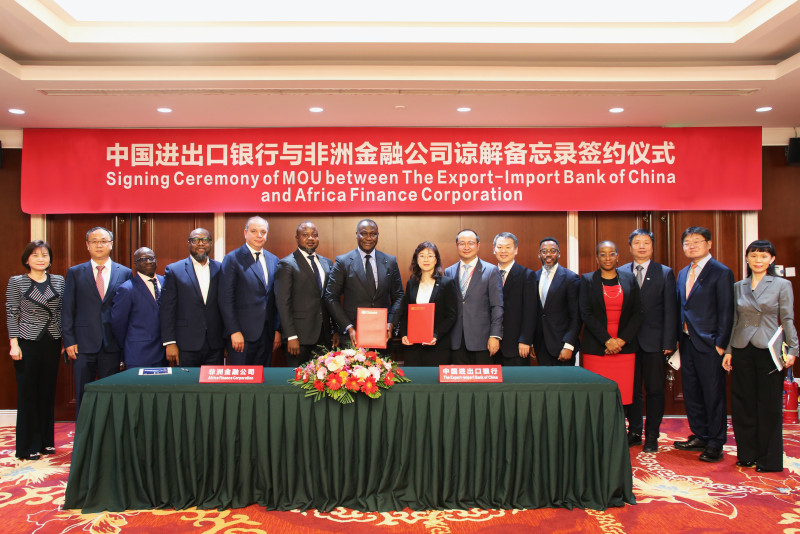
Africa Finance Corporation and the Export-Import Bank of China (CEXIM) Strengthen Partnership to Drive Trade and Infrastructure Growth Across Africa
BEIJING, China, February 14, 2025/ — Africa Finance Corporation (AFC) (www.AfricaFC.org), Africa’s leading infrastructure solutions provider, has signed a Memorandum of Understanding (MoU) with the Export-Import Bank of China (CEXIM) to deepen collaboration in financing strategic infrastructure and trade projects across Africa.
The agreement builds upon an existing relationship between the two institutions, dating back to 2018, and reinforces a shared commitment to accelerating economic development through sustainable investments. To date, AFC has secured a total of US$700 million in financing from CEXIM, including a US$300 million facility in 2018 and another US$400 million loan in 2023.
This renewed partnership will focus on financing trade and investment projects in key sectors such as clean energy, transportation, telecommunications, and climate change mitigation, while also facilitating knowledge exchange and collaboration on best practices in project structuring and risk management.
“Our partnership with CEXIM strengthens Africa’s trade and investment ties with China, creating new pathways for infrastructure development and industrial growth,” said Samaila Zubairu, President & CEO of AFC. “Strategic collaborations like this are key to accelerating Africa’s industrialisation and with CEXIM’s support, we are unlocking opportunities to build more resilient economies, mobilise capital at scale, and drive long-term prosperity across the continent.”
AFC has been steadily expanding its presence in the Chinese financial markets recently securing an AAA domestic credit rating from China Chengxin International Credit Rating Co. Ltd (CCXI) and an AAAspc issuer credit rating from S&P Ratings (China) Co., Ltd.
These ratings demonstrate AFC’s exceptional financial strength, disciplined capital management, and expanding access to diversified funding. AFC also finalised a US$1.16 billion syndicated loan last year, co-led by the Bank of China and the Industrial and Commercial Bank of China (ICBC) London Branch.
This collaboration underscores AFC and CEXIM’s mutual goal of fostering economic integration and sustainable development across Africa. Through this partnership, the two institutions will work together to mobilise funding for high-impact projects, enhance trade finance solutions, and support private sector growth across the continent.
Distributed by APO Group on behalf of Africa Finance Corporation (AFC).
Media Enquiries:
Yewande Thorpe
Communications
Africa Finance Corporation
Mobile: +234 1 279 9654
Email: yewande.thorpe@africafc.org -
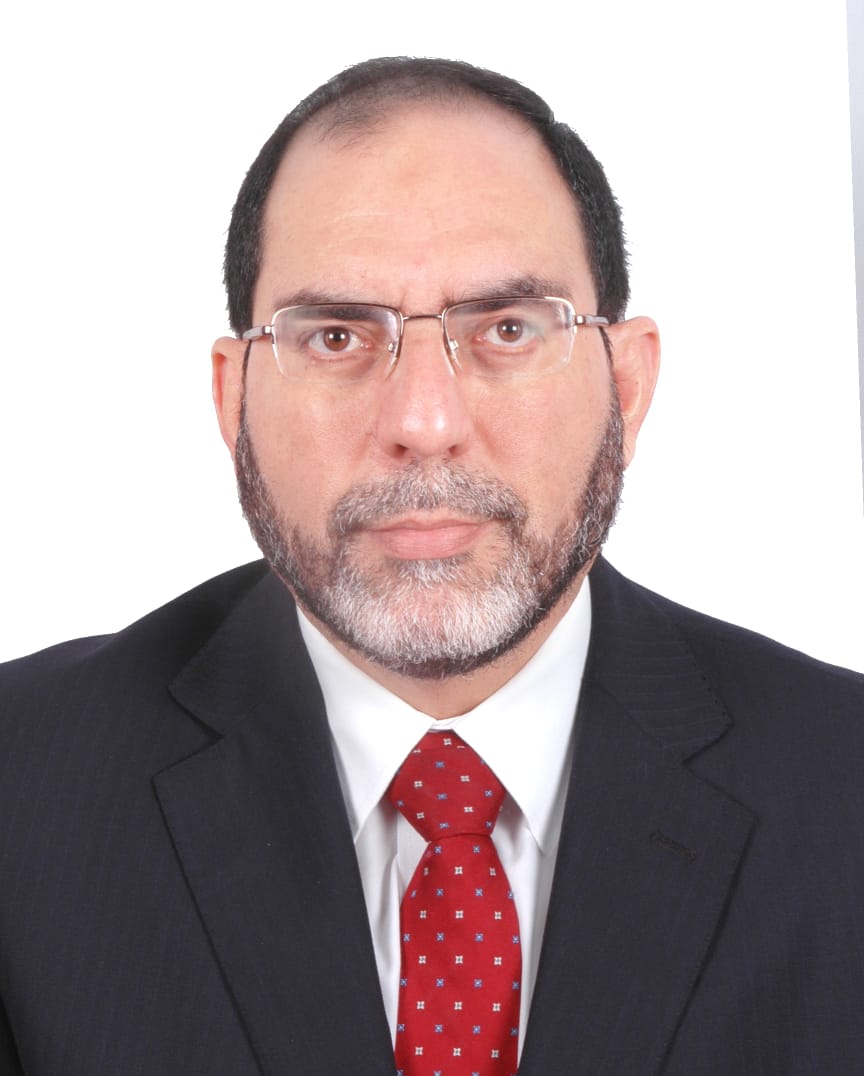
Combating Africa,3rd World Debt Burden
Story: Mohammed A. Abu
Mr. Sohaili Ahmed Zubairi, a globally renowned Islamic Banking and Finance(IBF) and Shariah Consultant, who is also a former Advisor to the Dubai Federal government on Islamic economy, has said that, the current age-old debt initiation system has completely failed.
That is, in providing the economic relief to the people whose countries borrow money from development financial institutions (DFIs).
This outdated method Mr. Sohail intimates, needs to be replaced by a disruptive approach with the help of technology which should work inversely than initiating debt and piling it up over the existing liabilities.
Reasons
“The borrowing by the Global South countries in US$ or any other foreign currency puts pressure on local currency, resulting in its depreciation which in turn increases the inflation.
“Another factor is rampant corruption resulting in massive misuse of borrowed funds. A tiny percentage gets rich thanks to siphoning of funds for their own benefit and the people for whom the money was borrowed never get to see any value and get poorer.
“Another downside element in keep on borrowing is that, since the borrowed funds were not deployed for any productive purpose, the interest becomes additional burden for which the country reduces subsidies if they were there, cuts the development and social budget and indulge in costly borrowing from local central and commercial banks, or goes back to same or another DFI organization to borrow more to be able to pay the interest on existing debt.
“The 3rd major disadvantage of such foreign borrowing by poor countries is the repayment of principal amount for which new borrowing is sought from DFIs.
“I have seen the countries borrowing from a different DFI to repay to an existing DFI. Each time a new borrowing request is made, the country’s credit rating goes down and it gets more and more difficult to get access to new money” laments Mr. Sohail adding, “So, nothing goes right for the hapless sovereign state”
Mr. Sohail was speaking during an exclusive interview with your favourite, the Eco-Enviro News Africa magazine on how IBF could be leveraged for addressing the 3rd World debt overhung with particular reference to Africa. The continent was said to have recorded a public debt of USD1.8 trillion as of 2022, a 183 percent increase since 2010 which was much faster than the growth rate of its GDP.In 2021 with African governments said to have spent 4.8 percent of their GDP on debt servicing compared to 2.6 percent on health and education.
Islamic Sovereign Bonds(Sukuk) to the Rescue?
Contrary to populist view that Sovereign, Sukuk is the perfect panacea to 3rd World debt burden Mr. Sohail notes that, looking at sovereign Sukuk to solve the problem is being naïve since it makes no difference whether you issue conventional bond or Islamic Sukuk.
This is because, Mr. Sohail notes, the legal opinion issued by the counsel representing the potential investors categorize the Sukuk as debt capital market instrument (DCM), same as bond, and not as the equity capital market (ECM) instrument. Same applies to local currency Sukuk which too goes to add to local currency debt.
“It is incorrect to consider that by issuing Sukuk, you would not incur debt. There is no difference between bond and Sukuk when it comes to initiating the debt instrument. By issuing Sukuk, you reach the same result as when you issue bond.
“This is unfortunate that Sukuk is considered DCM although it is markedly different from bond in that former is asset based instrument whereas the latter is clean borrowing. It is a condition that the return to the Sukuk investors is generated by the Sukuk asset whereby there is no such condition in bond which pays interest irrespective of the application of bond proceeds.
“Moreover, the Sukuk investors become pro-rata undivided owner of the Sukuk asset and thus are exposed to diminution in the value of their investment upon the Sukuk asset incurring any damage or total loss.
“Another aspect is that all African countries are situated in Global South and most of them have no country rating. Those who are rated have junk grade and will not find any international institutional investor for their Sukuk. Even if they are lucky to attract some investors, due to non-investor grade rating (or junk rating) they will be demanded very high pricing.
“This is the capital market norm that any investment made by an institutional investor or a bank must be cleared by their board of directors. The board only approves investor-grade instrument for investment, starting with AAA and ending at Baa3 (Moodys), BBB- (S&P and Fitch).
On what is his expert recommendation for African countries struggling to make the ends meet, Mr. Sohail said, he will strongly recommend that instead of over focusing on foreign direct investment which is a far cry, they must pay attention to deepen their domestic capital market.
“Here, they could consider issuing local currency Sukuk with entry threshold kept low to mop up the liquidity from grass root level. The household in any country have great potential to contribute but are never given importance.
“The local currency retail Sukuk shall also reduce the dependence of public and private sector on to the banking industry which in turn shall be able to divert funds towards projects of national development.
“Also, the demand and supply equilibrium shall come into play since thriving local currency capital market would force the banks to reduce the rates at which they lend money.
“A thriving example is Malaysia where the domestic capital market is so strong that the country hardly issues a foreign instrument” he added.
Islamic Asset Tokenization Option to Sukuk
On what sharia compliant option other than sukuk would he recommend, for debt ridden 3rd World countries struggling with the never ending debt spiral Mr. Sohail said, the disruptive approach, or otherwise termed as Islamic Asset Tokenization.
The Islamic asset tokenization, he says, could be used for any Sharia compliant asset, be it immovable or movable.
In simple terms, Mr. Sohail explains, the asset tokenization means fractionalization of the ownership of an asset in bite size tokens e.g. Ghanaian Cedi 100/- per token and the sale of tokens through blockchain. “Following shall be the benefits of such transaction”
- It would not be classified as DCM but ECM, hence, there shall be no increase in the sovereign debt. To the contrary, the tokenization funding can be diverted to retire the debt, starting from most expensive borrowing.
- Instead of relying on foreign assistance, the country shall stimulate its own domestic capital market and mobilize local resources to do large fund-raising by selling tokens to public. The amount shall then be first diverted to eliminate local currency debt followed by FC borrowing.
- The small size of tokens shall enable the state to mop up the liquidity from grass root level which has never been done.
- The Sharia compliant assets for the purpose of tokenization may include the government owned real estate whether rented or self-use, monetization of future road toll, airport, sea-port, fleet of planes, railway, road transport, or any other Sharia compliant asset.
- Enormous amount of funding has gone into making these large hard-core assets and the annual revenue generated from them stretches the recovery period to over a decade. The tokenization shall enable the release of massive liquidity which can be prudently utilized to reduce debt which in turn shall curtail debt servicing, thus sparing the funds for public service causes, which hitherto were assigned to payment of interest.
- If the private sector also follows the course and resorts to tokenization, there shall be less dependence on banking sector which shall indirectly result in diversion of spared funds to the developmental projects undertaken by the state at lower pricing.
- A government-owned or supported digital platform shall be needed for higher credibility. Several tokens can be traded at the platform at one time similar to various shares traded at a bourse.
- The investors can offload the tokens at any time third party buyers from within the country or the overseas diaspora
. Future Projections
Citibank anticipates tokenization to grow by a factor of 80x to reach $4T by 2030 whereas BCG puts it at $16T by 2030. Deloitte estimates 10% of global GDP to be tokenized by 2027 and JP Morgan states that tokenization is the killer of traditional finance.
On what is his expert opinion with regards to the clarion call made by Africa’s Islamic finance advocates and enthusiasts on governments of African countries to adopt Islamic finance as an alternative financial system, he notes as follows:
“Adoption of Islamic finance by the African states will offer an alternate financial system with the parameters embedded in honesty, fairness, justice, sharing and caring besides no hidden fine print.
“The Islamic financing principles are God made and not man made, hence they are free from exploitation, greed, dishonesty, misrepresentation, deceit and cruelty. To the contrary, man-made systems is heavily protective of the lender and harsh to the borrower.
“The reason for such cruelty is that the conventional system treats money as commodity which creates rigidity since money is on both sides i.e. lending and the repayment.
“To the contrary, the Islamic principles treat the money simply as a medium of exchange and not the commodity hence the money is only on one side and the on the other side you will find good, assets and services.
Introduction of IBF by first time Countries
“Any African country willing to roll out Islamic finance must make its banking, taxation and legal system accommodative to Islamic finance. This requires review of existing statutes and making changes wherever deemed necessary.
“The reason why the changes need to be made is that as opposed to conventional finance where ‘one size fits all’ i.e. all clients’ needs are met through interest based lending, the Islamic finance is comprised of sale contracts and investment contracts.
“Introducing Islamic finance without amending the laws may incur double VAT or GST, hence making the transaction unattractive due to overloading of levies at both ends” adds Mr. Sohail.
On what is his comments on Ghana’s President John Dramani Mahama’s recent announcement that the country plans to introduce Islamic banking instruments, Mr. Sohail notes,
“It is a great development and exhibits strong political commitment. The top-down approach is always effective for any new initiative. I would hope that the president makes it clear that the Islamic finance is ethical finance and therefore, open to all citizens of Ghana irrespective of religious affiliations.
What is Islamic Finance?
Islamic finance is just another financial system with the difference that it is based on trading and investment and derives profit from such transactions rather than lending money and earn interest.
Another feature of Islamic finance is that its principles are ‘cast in stone’ and have not changed since 7th century AD when Prophet Mohammed (peace be upon him) had perfected them before passing away.
These principles are based on morals and ethics embedded in Quranic teachings which is the last word of God Almighty to humans and has been preserved in the sense that not a single letter has been replaced, changed or amended.
This is possible since God has Himself guaranteed protection of the entire Quranic text. Many efforts have been done to alter the glorious Quran but all have failed since the text is guaranteed by no one else but the author of Quran – God Almighty.
In Quran, God instructed Muslims to obey Him and obey Prophet Mohammed (pbuh) in order to achieve impeccable belief (Iman). Hence, the first source of guidance is the holy book Quran, followed by the Sunnah – sayings, actions and traditions of Prophet Mohammed (pbuh) and the approvals he granted to sayings or actions carried out by his companions – men and women.
Since all Islamic financing and investment contracts were finalized by Prophet Mohammed (pbuh) in his lifetime, they became the cornerstone of Islamic finance without any compromise on their principles. Thus, a Murabaha contract is currently executed in the same sequence and manner as it was carried out during the life of Prophet Mohammed (pbuh).
There is a saying that the only constant in this world is the change, meaning nothing is constant. Islamic financing principles have proved the saying wrong since there has been no change in the Islamic contracts during last 14 centuries and they will continue to remain steadfast in the future as well.
I have observed this phenomenon several times since I joined Islamic banking in 2001 that pressure was brought on by the market forces on to the Sharia scholars to allow some changes to Islamic contracts to match with conventional financial system but no scholar could accommodate even a minor change since that would have tantamount to going against Quran and Sunnah.
Even if a scholar tried a minor change, the other scholars did not agree to it. The peer pressure work as a good check and balance measure in Islamic finance.
-
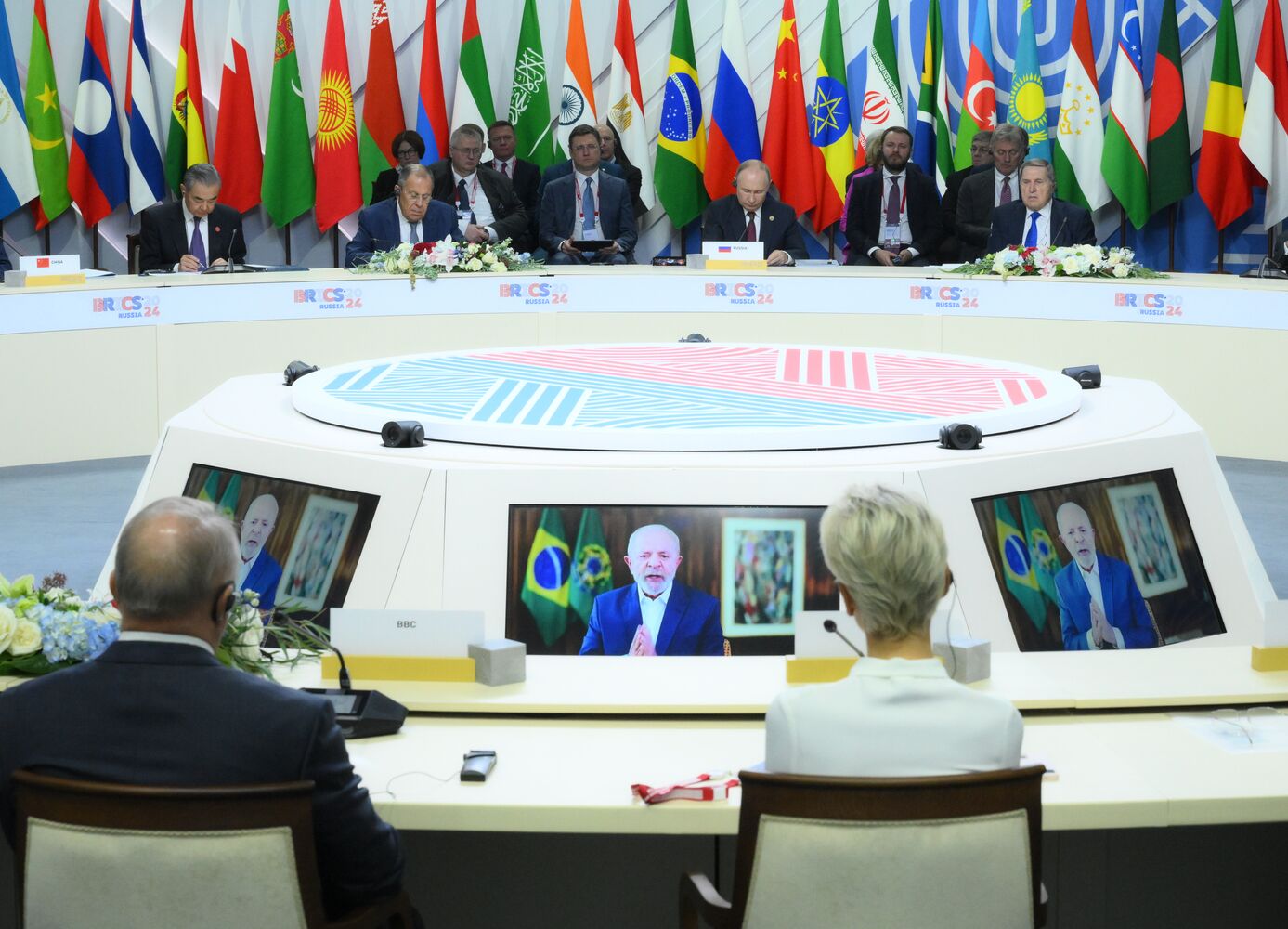
Brics+ countries are determined to trade in their own currencies – but can it work?
Associate Professor, China Studies Centre, University of Sydney
The Conversation ,First Published,26th November,2024
Photo(Brics Summit 2024)
Brics+ countries are exploring how they can foster greater use of local currencies in their trade, instead of relying on a handful of major currencies, primarily the US dollar and the euro.
The forum for cooperation among nine leading emerging economies – Brazil, China, Egypt, Ethiopia, India, Iran, Russian Federation, South Africa, United Arab Emirates – emphasised this determination at their 16th summit in October 2024.
Economist Lauren Johnston recently wrote a paper on this development. The Conversation Africa asked her for her insights.
Why do Brics+ countries want to trade in local currencies?
There are economic and political reasons to use local currencies.
Using local currencies to trade among themselves will lower the transaction costs and reduce these countries’ dependence on foreign currencies.
Over the past few centuries, the world’s economy has developed in a way that makes certain currencies more valuable and widely trusted for international trade. These include the US dollar, the euro, the Japanese yen and the British pound. These currencies hold value around the world because they come from countries with strong economies and a long history of trading globally.
When people or countries trade using these currencies and end up collecting or holding them, they consider it “safe” because the value of these currencies remains stable and they can be easily used or exchanged anywhere in the world.
But for countries in the global south, like Ethiopia, whose currency (the birr) isn’t widely accepted outside its borders, trading is far more difficult. Yet these countries struggle to earn enough of the major currencies through exports to buy what they need on international markets and to repay their debts (which tend to be in those currencies). In turn, the necessity of trading in major currencies, or the inability to trade in them, can create challenges that slow down economic growth and development.
Therefore, even some trade in local currencies between Brics+ members will support growth and development.
Oil exporter Russia is a unique case. Though there are fewer foreign currency constraints overall, Russia faces extensive financial sanctions for its war of aggression against Ukraine. Using a variety of currencies in its foreign transactions may make it easier to get around these sanctions.
Politically, the reasons for using other currencies primarily relates to freedom from sanctions.
One of the tools for making sanctions work is an international payments systems known as Swift (Society for Worldwide Interbank Financial Telecommunication). Swift was founded in 1973 and is based in Belgium. It enables secure and standardised communication between financial institutions for international payments and transactions. And it’s almost the only way to do this.
It was first used to impose financial sanctions on Iran in 2012, and has since been used to impose sanctions on Russia and North Korea.
If a country is cut off from Swift, it faces disruptions in international trade and financial transactions, as banks struggle to process payments. This can lead to economic isolation and challenges in accessing global markets.
The reality, and possibility, of exclusion from Swift’s payments system is one of the factors galvanising momentum towards a new payments system that also relies less on the currencies of the countries that govern Swift – like the euro, Japanese yen, British pound and US dollar.
What are the likely challenges they will face?
The Brics+ plan to use local currencies faces some hurdles.
The central problem is the lack of demand for most currencies internationally. And it’s hard to supplant the international role of existing major currencies.
If, for example, India accumulates Ethiopian birr, it can mainly only use them in trade with Ethiopia, and nowhere else. Or, if Russia allows India to buy oil in rupees, what will it do with those rupees?
Since most countries seeking alternatives to dollar dependence tend to sell more than they buy from other countries, or are lower-income importers, they must consider what currencies to accumulate via trade.
When it comes to payment systems, at least, alternatives are emerging.
Brics+ is creating its own, Brics+ Clear. Some 160 countries have signed up to using the system. China also has its own, Cross-border Inter-bank Payment System, which broadly works the same way as Swift.
There’s a risk, though, that these payment methods could merely fragment the system and make it even more costly and less efficient.
Has trading in local currencies been done elsewhere?
Not all trade is done in major western currencies.
For example, in southern Africa, within the Southern African Customs Union, the South African rand plays a relatively important role in cross-border trade and finance. Just as in south-east Asia the currencies of Singapore and Thailand compete to be the dominant currency in the sub-region.
China – the world’s biggest exporter and producer of industrialised goods – is also signing bilateral currency swap agreements with countries. The goal is greater use of the renminbi in the world.
As a means of circumventing sanctions, India and Russia recently trialled using the rupee to trade. Russia’s oil exports to and through India have risen strongly since the Ukraine war and some 90% of that bilateral trade takes place in the rupee and rouble. This leaves Russia with a challenge – what to do with all the rupees it has accumulated. These deposits are sitting in Indian banks and being invested in local shares and other assets.
Another example of efforts to side-step major international currencies is China’s model of “barter trade”. The model works like this: China exports, for instance, agricultural machinery to an African country and receives payment in that country’s currency. China then uses that currency to buy goods from the same country, which are then imported back to China. After these goods are sold in China, the Chinese trader is paid in renminbi.
Ghana is one country involved in this barter model. Challenges facing the model include the digitisation of payments and trade, and trust – high levels are needed to establish and maintain relationships between trading parties as individuals and as businesses. It also requires some level of centralisation and coordination, but lacks strong laws, regulations and industry standards. This means that different platforms and enterprises may not be compatible, which can add to transaction time and costs.
Another example is when Chinese investors in Ethiopia make profits in birr. They use these birr to buy Ethiopian goods, like coffee, and export the goods to China. In China, when they sell these goods, they receive renminbi. So they transfer their profits from Ethiopia to China by increasing Ethiopia’s exports to China.
Anecdotal reports suggest this is feasible at a small scale but has relatively high coordination costs.
There could be other challenges. For example, if Chinese buyers pay Ethiopian coffee farmers in their local currency, instead of US dollars, it could lead to fewer dollars being available overall. Some international transactions still rely heavily on dollars.
How should Brics+ nations structure their arrangement?
There is no simple, or easily scalable, solution to moving past the reliance on major international currencies or circumventing Swift.
A fast, digital payment system is needed. This system would calculate and balance currency demand efficiently. It must also be reliable, replace parts of the current system, and not create extra costs for countries that aren’t using it yet.
Although some Brics+ members, like Russia, may have more interest in fast-tracking change, this may be less in the interest of other Brics+ members. A move away from Swift, for instance, requires buy-in from local financial institutions, and those in African countries may not be under pressure to shift to a new lesser-known platform.
Given these challenges, I argue that Brics+ should progress incrementally. What can happen soon, though, is to conduct some trade in local currency.
SOURCE
THE CONVERSATION
